Mexico City, 2 November 2015.– Between May and December 2015, PBI Mexico will publish a series of interviews with Human Rights Defenders which we accompany or with whom we maintain a close relationship. This month we present an interview with Lucha Castro, co-founder and coordinator of the Centre for the Human Rights of Women (CEDEHM), from Chihuahua.
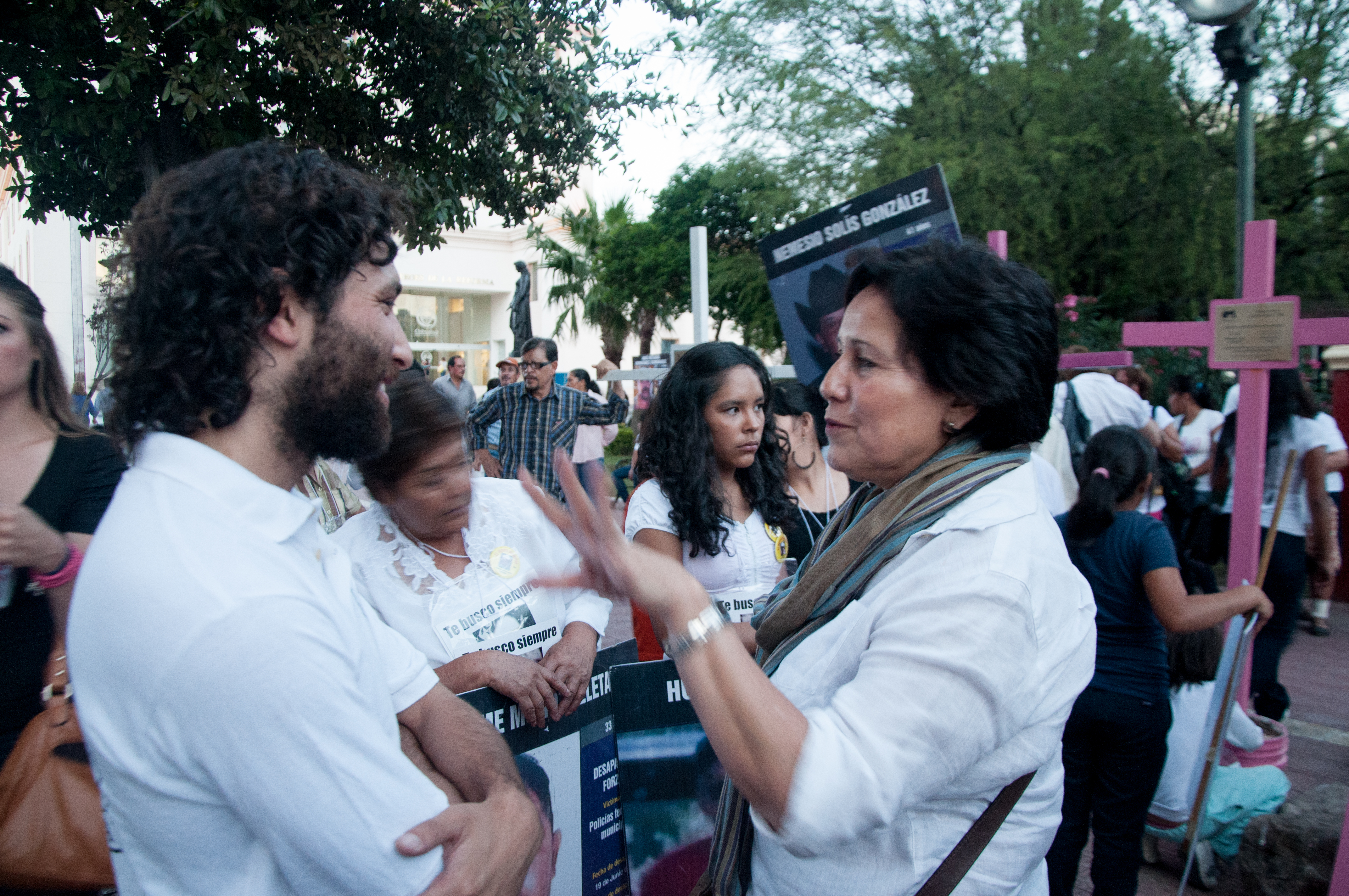
Photo: Lucha Castro speaks with PBI staff during event in Chihuahua © PBI Mexico
Becoming a Woman Human Rights Defender
My name is Lucha Castro and I am a human rights defender. I am co-founder and coordinator of the Centre for the Human Rights of Women CEDEHM [Centro de Derechos Humanos de las Mujeres]. I also participated 20 years ago in founding the Barzón. The mothers of several victims asked me to be their lawyer. It was then that, along with other organisations, I began working on violence against women and on the femicides occurring in Ciudad Juarez and Chihuahua. Later, when women and relatives of tortured and disappeared persons began arriving at CEDEHM, we could not say no to them so we expanded our work to torture, enforced and involuntary disappearances and extrajudicial executions. But then human right defenders who had been threatened also came to us, so we support them as well. When I started in the “barzonista” movement I considered myself an activist. In my profession as a lawyer I was defending my rights and those of others, ever since my father lost all of his property due to the stock market crash. Over time I realised that I am a human rights defender and this is where I feel most comfortable in my skin. It is a life project, a way of living, of being in this world. To the coming generations, I want to say that it is worth spending your lives working for human rights. All human beings can decide. That's all we have; we can decide how we want to spend our lives. But when one devotes his or her life working for human rights, at the end of the day, one feels as though they are left carrying lighter luggage; you are more fulfilled at the end of life. Also, in the world of the defenders of human rights one never gets old. On the contrary, the passing of the years gives you more wisdom to understand life better. Being a female human rights defender in Chihuahua implies you are denouncing and questioning the institutions and the concept of security imposed upon us. We need to maintain a strong position if we want to be heard. But in a patriarchal and sexist world the fact that a woman publicly contradicts the prosecutor or the governor upsets them. The state powers believe that women should not be doing this, but instead be defending human rights through an merely “assistencialist” manner. If I were helping the victims without empowering them, I would be a good woman who helps other women so they are no longer beaten. However, in the type of defence work that we do, teaching the people to raise questions in order to put an end to violence, they say that we are defending criminals. Our ethical commitment to the victims, the fact that we explain, question and reflect with them on the structural causes of violence against women, upsets them because we are finally working against the patriarchy, and we are against institutions that have too many privileges.
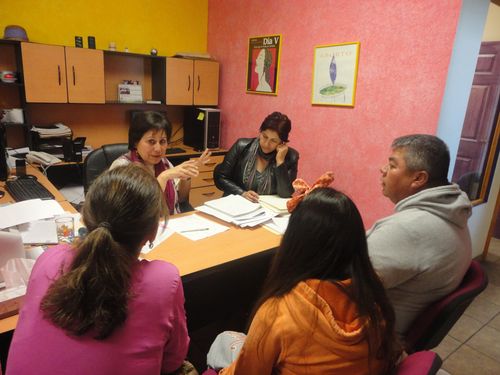
Photo: Lucha Castro at the Centre for the Human Rights of Women © CEDEHM
Being a human rights defender, a mother and grandmother
There is a price, a high cost that must be paid, especially for the families. It has caused me a lot of pain to see my children witnessing the threats we have faced since they were little. I remember once when my son was studying across the border. We had a case of enforced disappearance attributed to the military and it was a high-risk situation. He said “look mom, they won´t do anything to you but they will go after me in order to hurt you”. His four hour trip up to the border was an ordeal for me. When I was raising my children I had a feeling of guilt, as many women do. I did not know if my passion for human rights caused me to neglect my family. It was also difficult when I returned home to my private life to leave the intense relationship with the authorities behind. I had to say to myself, now you're not there, you're here. Now, from a distance and having my children all grown up, I realise that it was the best thing I could have done for them. They learned the value of defending rights. If I'd had another profession, they may have chosen a different path for themselves. Defending human rights also means separation. Due to the risk that I am facing, we decided that the family could not come to Chihuahua. So we have found creative solutions. I write stories for my grandchildren. I tell them the stories of the women who come here, without all the morbid details. So, I share with them the work done by their grandmother. Sometimes I remind them that this is a story and it is also another reality.
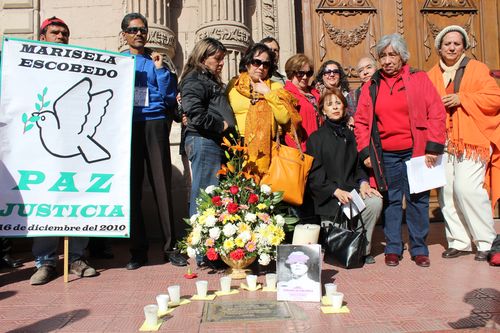
Photo: Lucha Castro and members of the CEDEHM during a memorial of Marisela Escobedo © CEDEHM
Smear campaigns and protection measures
I was Marisela Escobedo’s lawyer, the mother of Rubi Fraire Escobedo, a young woman murdered in Ciudad Juarez. Marisela was a great activist and from being a victim she became a human rights defender. 16 December, 2010 she was killed in front of the state government palace in Chihuahua. December 2010 she had been received by the State Attorney General and accompanied her to that meeting. On that occasion, she accused state and federal officials who were protecting the murderer of her daughter. I said to the Attorney General that he had to protect her because otherwise she would get killed. She was killed within eight days of that meeting. In two consecutive years the state presented two different persons as suspected murderers. We demanded justice for Marisela and we wanted to know which of these two persons was the actual murderer. Our questioning made the state governor and other authorities extremely angry. They began making public statements saying that although they were making every effort possible to move the state forward, the human rights organisations were devoted to speaking ill about them since that’s how they made a living. They added that those who do not like living in Chihuahua should leave. The State Secretary General said that I have political interests on the case and reminded the public that, thanks to my "passionate defence", now a criminal who should be in jail was under house arrest. He said that I had offended the public prosecutors and the police who did that research. In this context of such pain and suffering, where families are so hurt by violence, this is a media lynching and a call for a shut down coming from the state executives. This puts me in a situation of great vulnerability, because here these campaigns have ended in murder. The murder of our colleagues, Ismael and Manuelita, occurred after a brutal smear campaign against Barzón, which was like an open door for them to be murdered. Due to the context of this campaign, and because our organisation already had precautionary measures granted by the Inter-American Commission on Human Rights (IACHR) since 2008, the Commission asked the Court to provide us protection. This was granted in February 2013. I believe the court understood that in a society and a context like ours, the statements of the authorities were interpreted in a way that “when the head speaks, the body acts”. The provisional measures of the Inter-American Court urge the Mexican government to ensure physical, emotional and security measures for protection, to investigate the facts and to stop the smear campaign. They came to our offices to implement structural measures; these are the actions that cost the government less, because in the end it is only money. They put cameras and gates and they think they have done their job. But to investigate, to assume responsibility for the safety of the human rights defenders, this they do not care about.
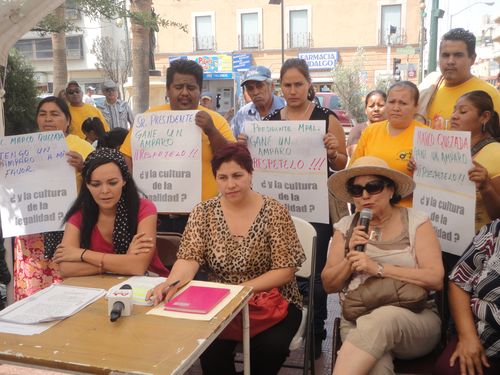
Photo: Lucha Castro during an event in Chihuahua © CEDEHM
The National Protection Mechanism for Human Rights Defenders and Journalists
For us, the mechanism is part of a political strategy of the Mexican State saying: “do not worry Inter American-Commission. You no longer have to grant precautionary measures, because we are here to evaluate, to grant and to decide how to grant these measures.” I’ll give you an example. After the human rights defenders Ismael Solorio and Manuelita Solis were murdered, the Barzón was in a risky situation and we asked for the help of the Mechanism. The family, several Barzón leaders and I, as their lawyer, went to Mexico City. The mechanism had been running for only one day and we gave it its first trial run. We were informed that they would apply the regular procedure. They sent an email and asked our fellow defenders that if they wanted to benefit from the Mechanism they had to give up the precautionary measures they already had been granted by the IACHR. If one wanted the protection of the Mechanism one had to give up the other. My colleagues decided they did not want to do that. A week later, the Chihuahua police arrested two people in the Community Benito Juarez, including Barzón leaders and environmentalists and tortured them. We sent a report to the Inter-American Commission and they expanded the precautionary measures.
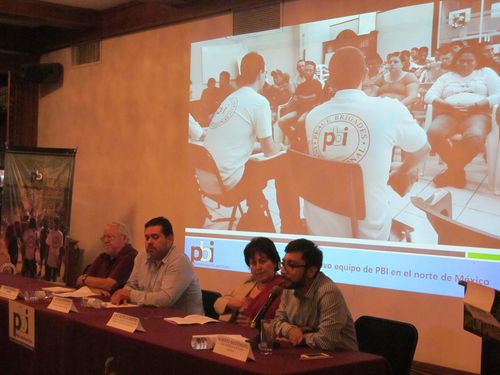
Photo: Lucha Castro together with other Mexican Human Rights Defenders during the event that marked the opening of PBI's Northern Team © PBI Mexico
Disappearances and human trafficking in Chihuahua
In CEDEHM we have welcomed many relatives of missing persons and when the mothers and sisters arrived to the Centre we realised that, for example, in a city like Cuauhtemoc, there are at least 1,500 missing young people. We can say that there is a “youthicide”. And this is a reality that is not recognised by the state. For families to have a son or daughter missing means a life of never ending pain, and they live a life of conflict. So we have worked with these families in various ways. We have started delivering psycho-social support, we are documenting cases and we are also reviewing the files with the District Attorney, but only with this specific one, since it is a very high risk situation because the organised crime is involved and there is a terrible infiltration of organised crime within the police.
I would also like to mention the human trafficking that here in Mexico is a reality. Wherever there are weapons and drugs being trafficked, there is human trafficking taking place as well because when both cartel member and police officers are sent to the mountains to fight against each other they do not take their loved ones with them. This is when the hunting begins. They go and take girls from the communities. This issue is not on the agenda, but if forced disappearances are not recognised, than human trafficking is much less so. There are no proper investigations and few trafficking cases have a final ruling in court. How can we more clearly prove our absolute inability to address this issue? This happens because the victims of trafficking are women and women are a truly disposable commodity, which is not even a topic to be discussed. This is the matter that has the most vulnerability in Mexico and we know this is true because you are at serious risk when you work against trafficking.
* This interview was conducted by Susana Nistal and translated by Annie Hintz
